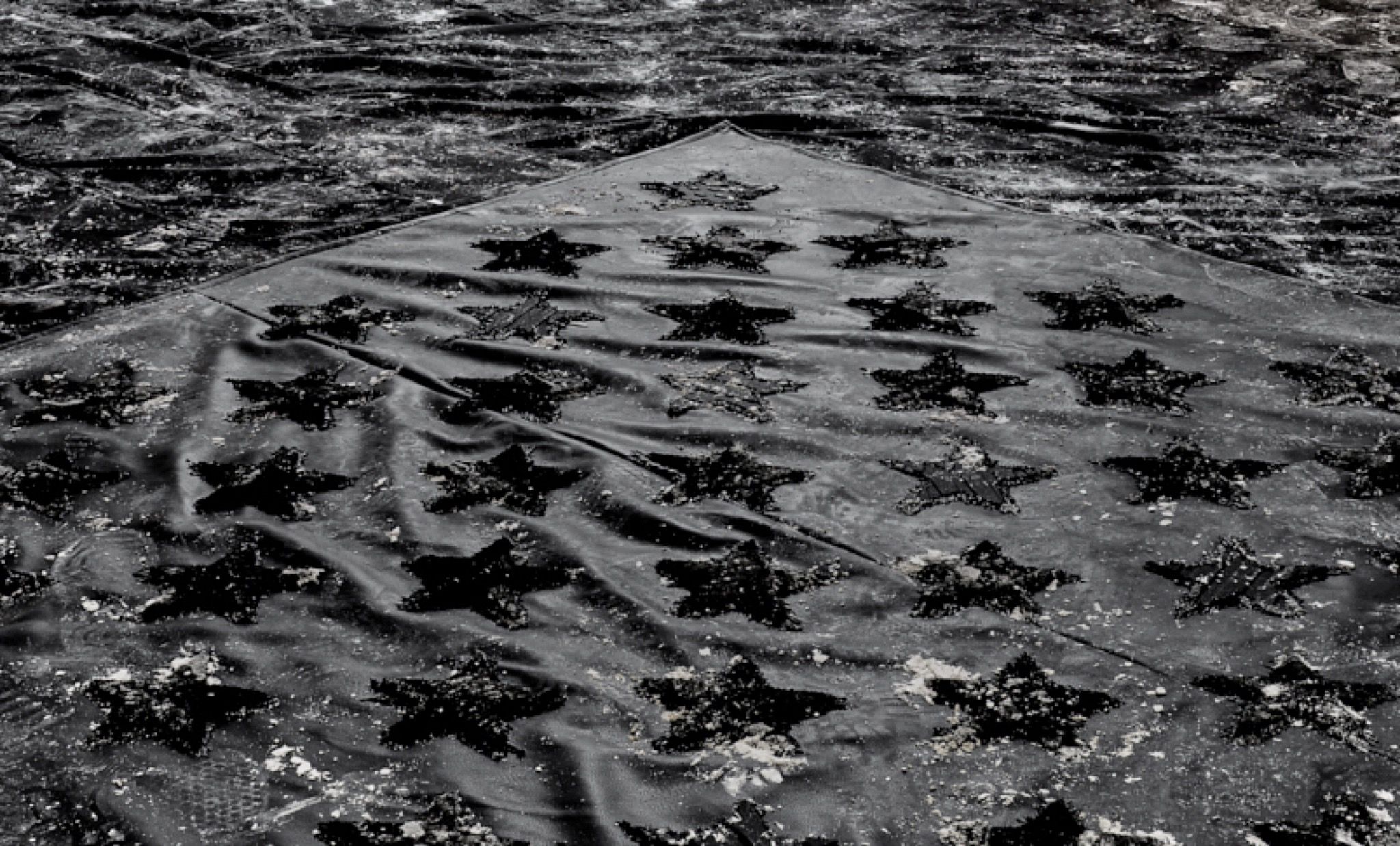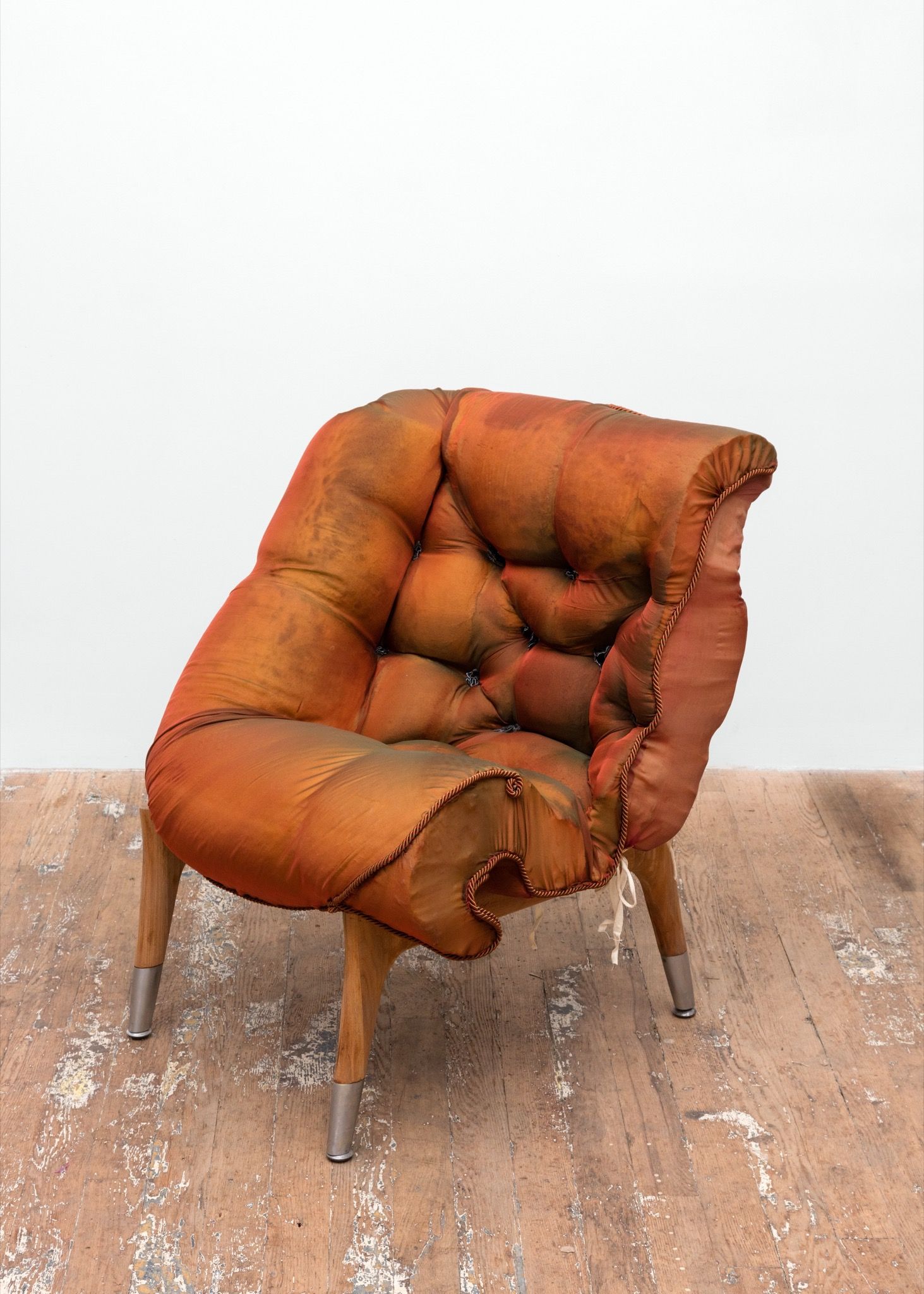Metagaze: SHYGIRL Stares Back
|Khalif Jones
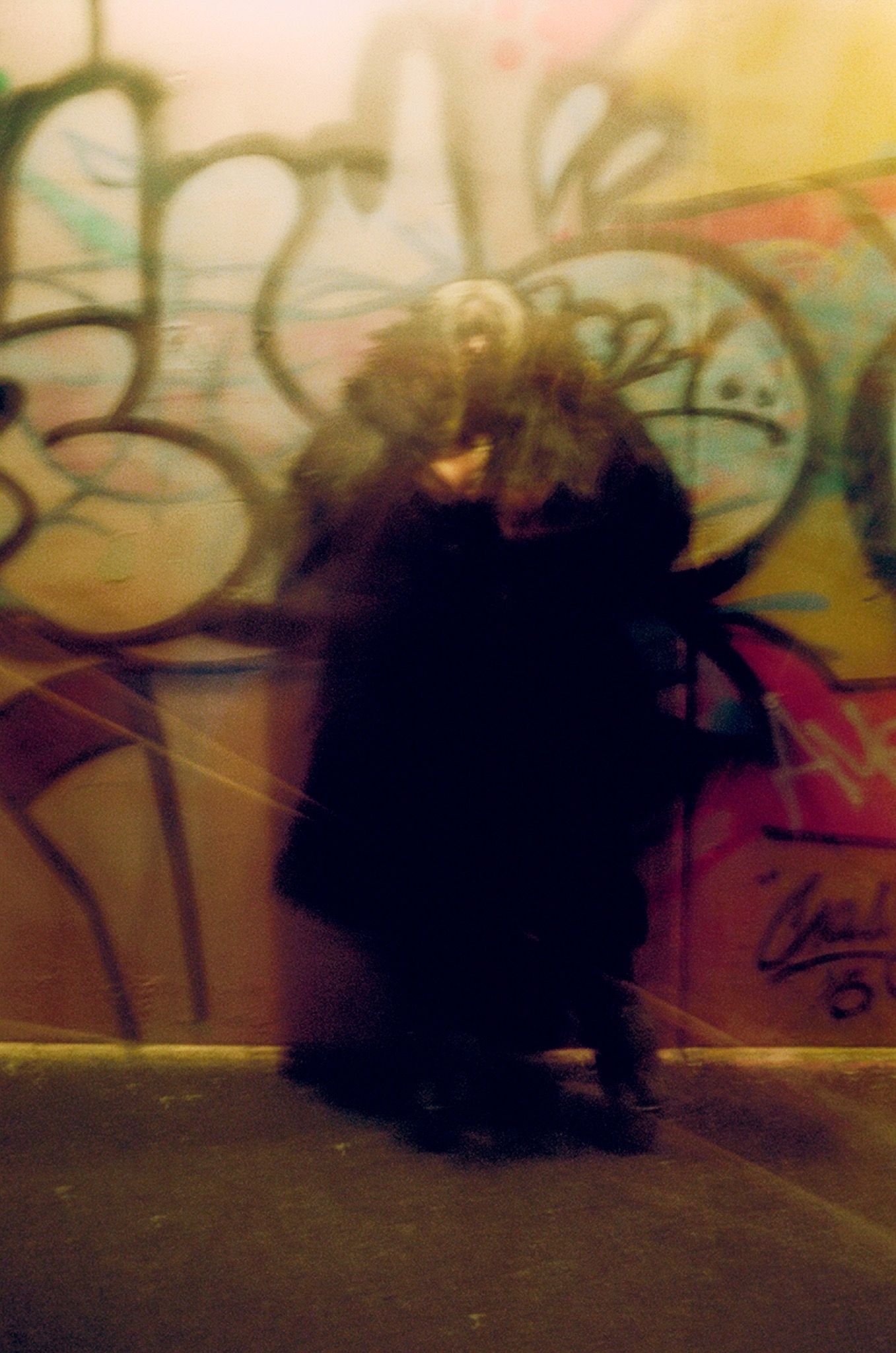
jacket DION LEE; coat MM6 MAISON MARGIELA; bodysuit SKIMS; boots RICK OWENS
SHYGIRL created four alter egos for the release of her latest EP, ALIAS – Baddie, Bovine, Bae, and Bonk – each complete with individual biographies, star signs, and CGI avatars. These characters animate her artistic and erotic personae, but they are also tools with which the South London native maps and overturns the stereotypes audiences project onto the artists they observe. SHYGIRL once performed live wearing a dress printed with her most-liked selfies on Instagram – and her practice is an exploration of the images, conscious and unconscious, that make up the self.
Fellow musician and friend Khalif Jones spoke to SHYGIRL for the sold-out 032c Issue #39 at the very site of image production: on location during her cover shoot with photographer Eric Johnson, where she interrogates and reclaims the gaze, with all its archetypal baggage.
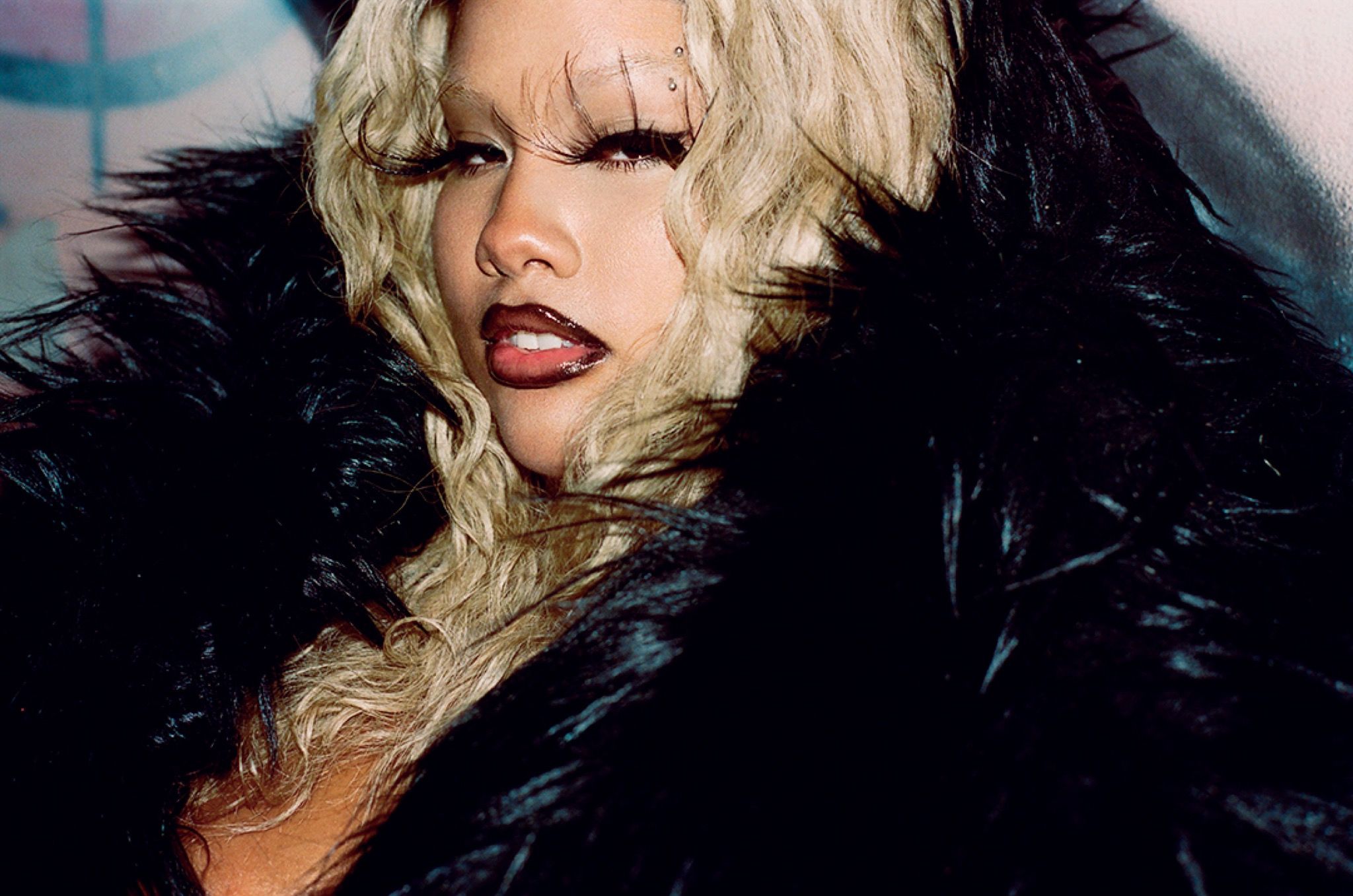
jacket DION LEE; coat MM6 MAISON MARGIELA; bodysuit SKIMS
“I want to talk about toxic masculinity in this interview.” In true form, Shygirl takes the reins of our conversation soon after we have departed on a luxury bus to the photo shoot location. Shygirl’s music, like the artist herself, exudes confidence and power. Over bombastic bass lines and rich electronic textures, she delivers lyrics in a myriad of voices, in tones smooth and magnetic, cunning and sometimes delightfully condescending. Her words merge poetry and prose to create worlds and to “direct gaze,” as she puts it – and today, our gaze is on Shygirl.
Growing up in England as a mixed Black woman, and working in the music industry, Shygirl has unsurprisingly had to reckon with a lot of prejudice, sexism, and bullshit. Cultural discourse and mass media may claim to have turned people’s attention to social justice and equality, but as Shygirl reminds us, the patriarchy and our culture of misogyny have yet to be dismantled. Toxic behaviors persist, often by adapting, depersonalizing, and tabooing the language of progress. Shygirl gives me some examples:
“‘Your behavior is aggressive to me’ or ‘You just gaslit me’ – you can’t even say those words now, because people associate those words with larger situations they have in their heads, and they can’t associate that with what they’ve done. When I’m having those kinds of conversations, I have to find ways of giving the explanation of what it is they’ve done without the summary, even though I know we both know what ‘gaslighting’ is. It’s damaging because we’re having these bigger conversations about how not to treat women, but then we don’t use the words in the situations they actually apply to, so they never know that’s what they’re doing. If they can’t identify that there’s a pattern of behavior, then how are they ever going to stop it? You can’t be scared to say the word. You have to take the time to explain, but you have to be able to say the word.”
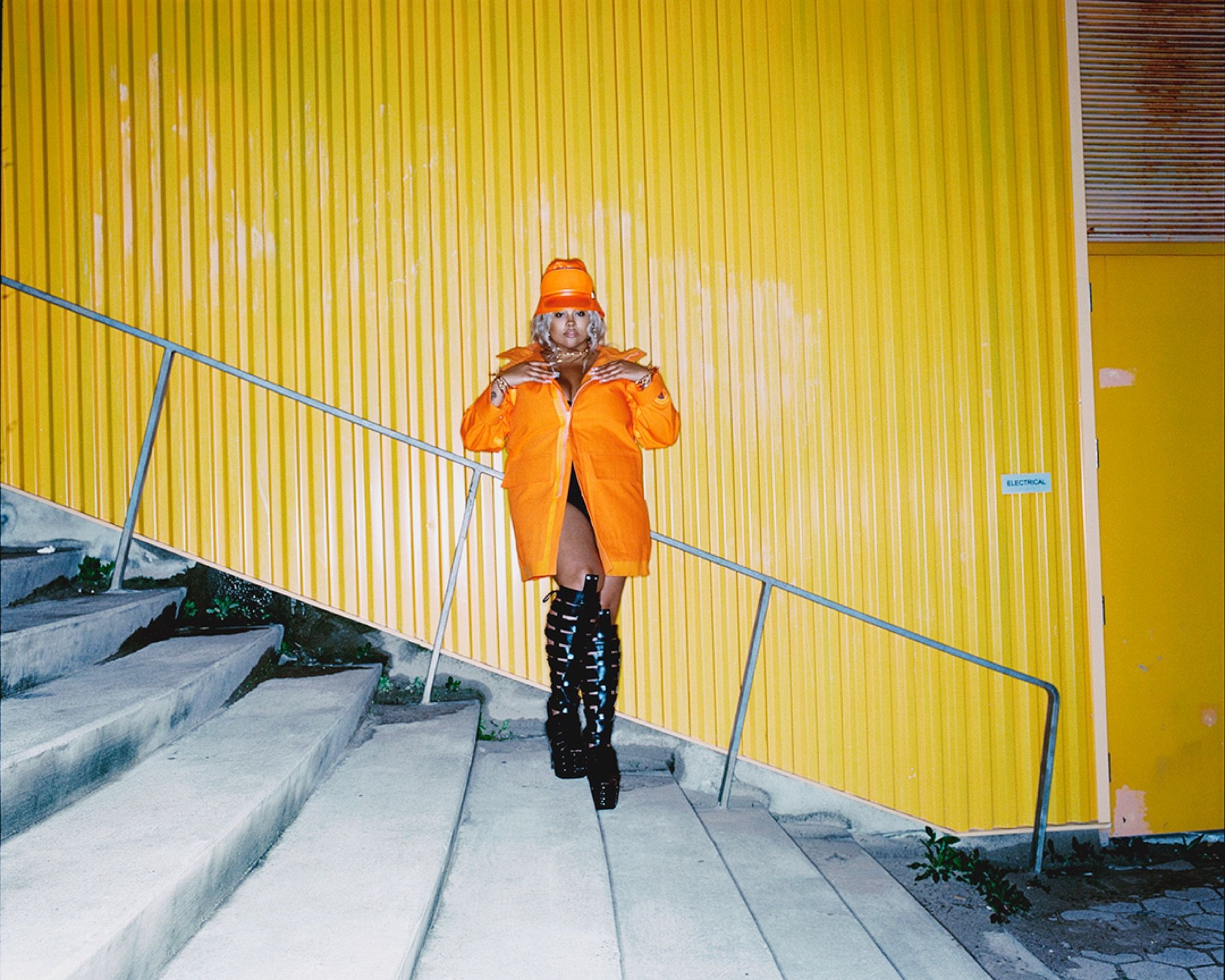
hat and coat BURBERRY; necklace MUGLER; earrings PANCONESI; bodysuit SKIMS; boots RICK OWENS
Shygirl has been acclaimed as an innovator in the UK and among electronic music communities globally since her 2016 breakout song, “Want More,” which landed in a Savage × Fenty campaign the following year. She has since been gaining the attention of the rest of the world. Self-released on Nuxxe, the label and collective that Shygirl founded, her 2018 EP Cruel Practice was called “captivating” by music industry press. In 2020, an unproductive year for many, Shygirl managed to fit in a world tour as well as collaborations with both Arca and the late, great Sophie. Her entrepreneurship and support of other artists through Nuxxe is just one way that Shygirl’s glow-up transcends the usual hype. Earlier this year, she appeared on the 2021 edition of Forbes’ “30 Under 30” list.
Shooting her for the cover of 032c is Eric Johnson, a cult photographer based in New York, where his studio is nicknamed Upstairs at Eric’s – a collective space in downtown Manhattan with a reputation for throwing some of the best house parties in the city. Johnson is known for portraits of celebrities and club kids, and of musicians at pivotal points in their careers – including Biggie Smalls and Aaliyah – and Shygirl is at a breakout moment, too.
“The way I’ve always learned and understood things has always been to ‘do.’ When I started making music and people were hitting me up to release stuff on record labels, I didn’t really understand what a label does. I didn’t know anything about the music industry, really. I looked things up and saw the limitations of what I could do for myself – because that’s a comfortable place for me, you know? When I’m learning, I’ll figure out when and if I need someone else. I was, like, ‘How could I ask for someone else’s help? How could I know what to ask for if I haven’t tried it myself? How can you expect people to do for you what you won’t even do for yourself?’ That’s how I was raised. If I asked my dad for an explanation of something, he’d be like, ‘Look it up and then tell me’ – even though he knew the answer.”
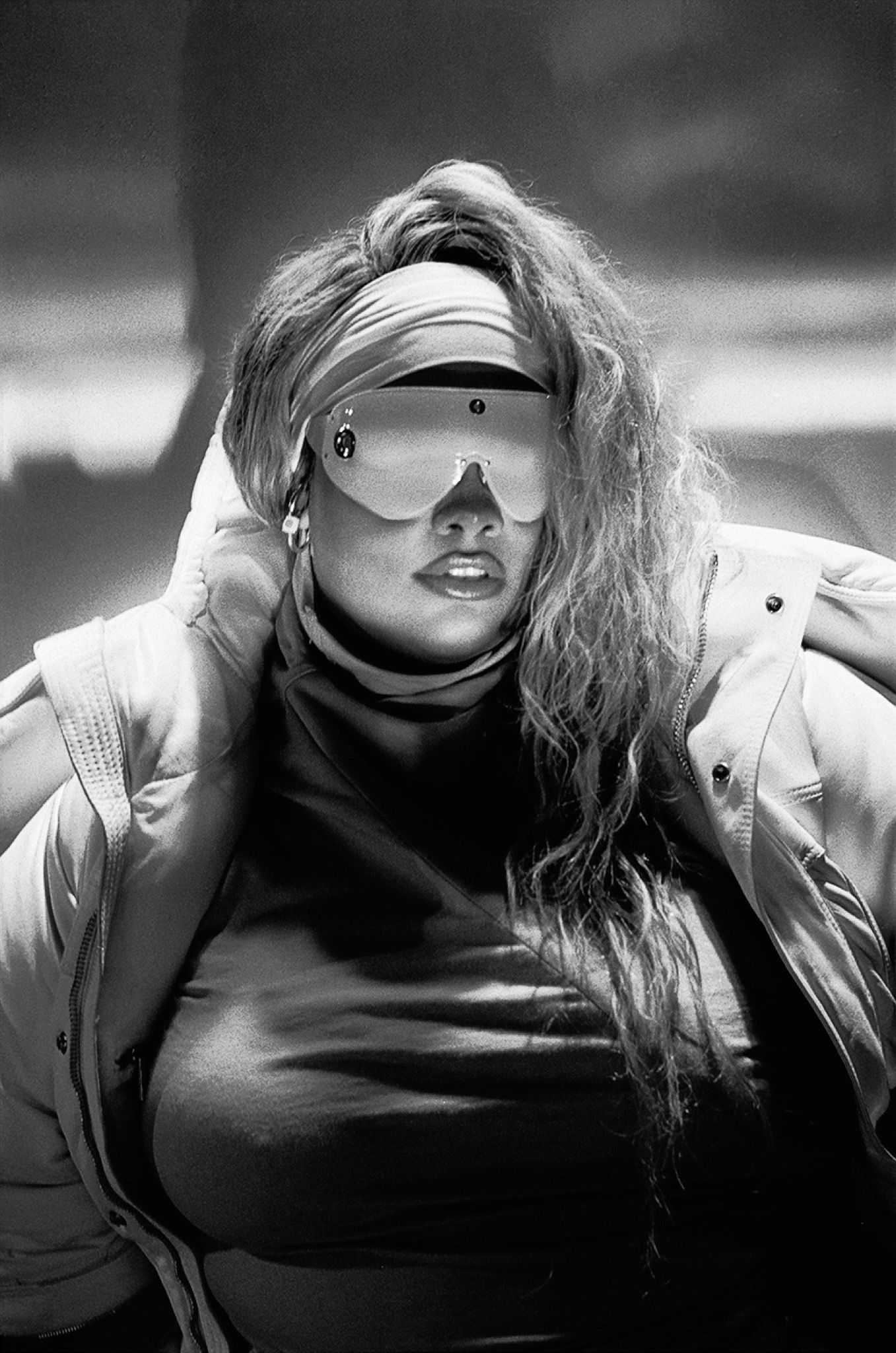
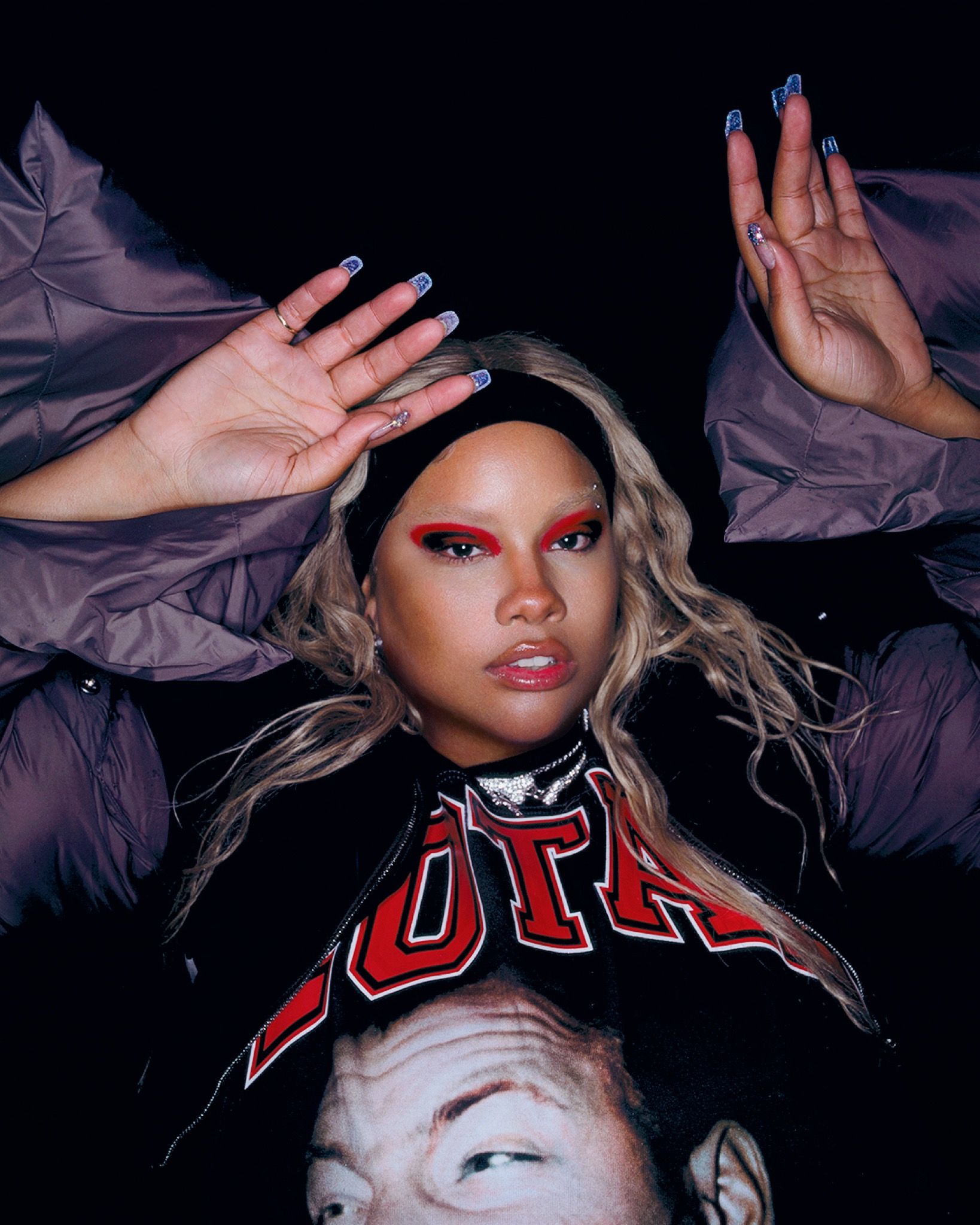
Left: sunglasses and jewelry ACNE STUDIOS; jacket HOOD BY AIR; dress RICK OWENS; headband SHY'S OWN
Right: jacket RICK OWENS; top HOOD BY AIR; earrings ALAN CROCETTI; necklace VIVIENNE WESTWOOD ARCHIVES from W HOUSE NYC
Life has demanded that Shygirl be a connoisseur of communication. It’s not uncommon for artists to create work inspired by their own emotional experiences or the struggles raised by identity, but strong songwriters are the ones who have mastered the art of storytelling in ways that connect to the experience of others. Shygirl’s work seeks to build entire worlds in the minds of her audience. Last March, she played a show at a small venue in east London – her last live performance before Covid – in front of a warped, mirrored background. “There was something really nice about having the audience watch themselves as they watched me. It was, like, ‘You’re watching me, but I see you, and this is what I see.’ I wanted people to be reminded of my humanity, because that’s something that gets lost with how commodifiable what we do is.’”
“Twelve,” the first track on Alias, begins with spoken word: “I mean, I know, It’s kind of bad. / Naughty … for you. / Waiting, watching, fantasizing … / So you like what you see?” “Poetry’s always been the most dramatic,” Shygirl says of one of her preferred forms, and the opening verse on “Twelve” is more than a lovable intro to a horny piece of electronic music. The song’s name is a direct reference to the young age at which Shygirl first grappled with the male gaze. “It wasn’t something I thought of consciously, like, ‘I’m going to write about being sexualized too young,’” she says. “I just had things I had never said, and then I realized that was the story I was telling.” Her writing process is an act of catharsis that disregards the algorithmic fads and shallow lyrical motifs that define most music in the digital era. “I just couldn’t live with all the angst and turmoil I was going through on a daily basis. I needed it to have a reason.” The result is songs that are deeply relatable – but reactions to her work are just as codified by misogyny as her day-to-day experience is.
“It’s so easy to say that I’m literally just talking about sex, but that’s just a question of how much you want to engage with it. People aren’t always thinking about the art of music and all the ways it can be read – they don’t do that enough anymore. The whole point of making art is to let other people engage with it, you know? And too many people are scared to read it on another level. They say, ‘I don’t see race.’ Well, you’re going to have to see race; you’re going to have to see my womanhood and my economic background to understand what’s going on here.”
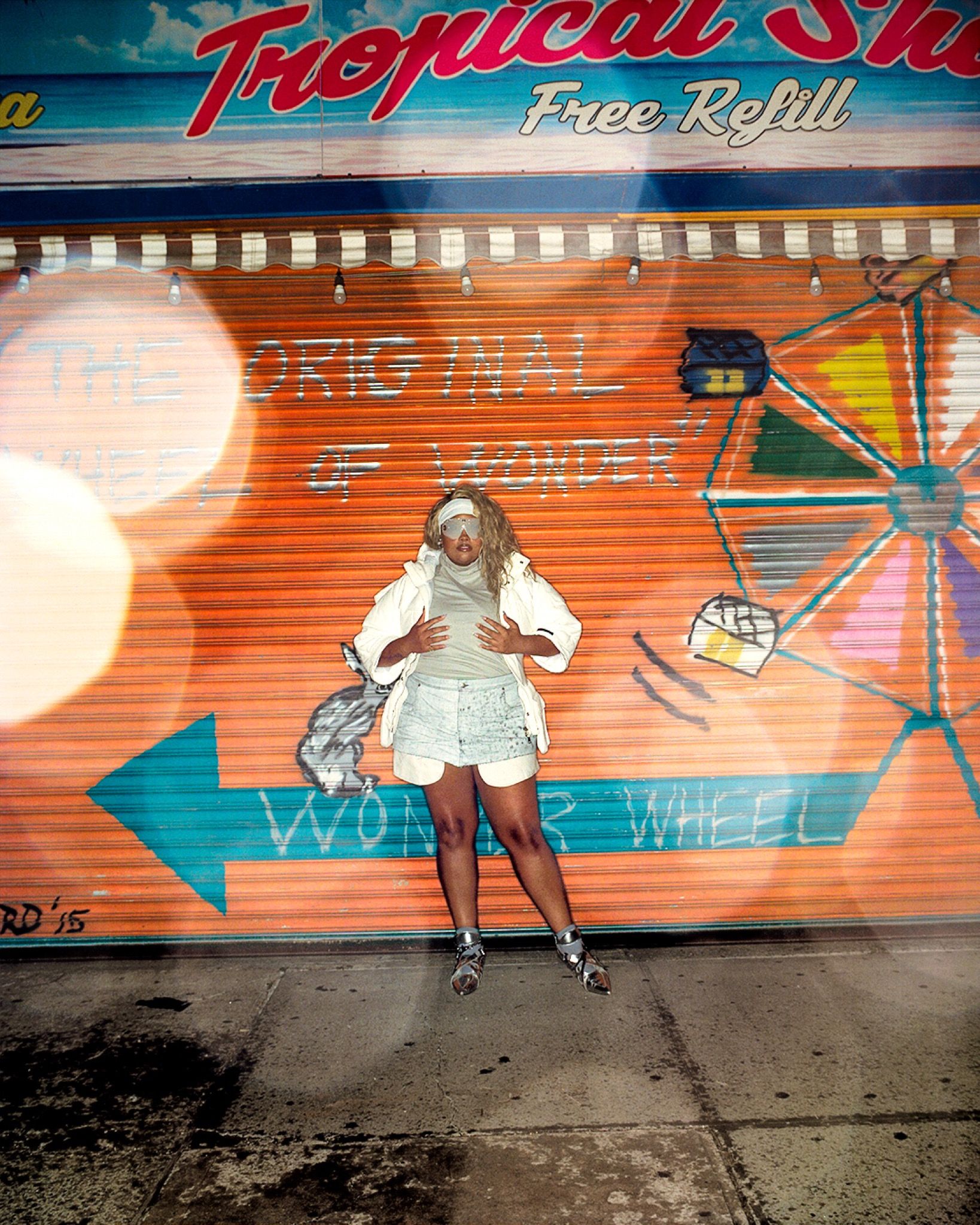

sunglasses and jewelry ACNE STUDIOS; jacket and shoes HOOD BY AIR; dress RICK OWENS; headband SHY'S OWN
The time Shygirl spent alone during lockdown allowed her to reflect on what she does and doesn’t miss about the world outside. Now, she isn’t focused on the opinions people walk away with.
“I think I’m done with ‘being tough.’ I grew up with this idea of ‘being tough’ – of doing more than what is expected of you. Because actually, not much is expected of you. You’re expected to be compliant and deal with more than your male counterparts, and have pride in it. There isn’t any pride in ‘being tough,’ because in the end you’re just taking other people’s shit. I don’t have to be palatable to everyone. A lot of my journey in music has been about being digestible in certain spaces where someone like me hasn’t been before, and making people feel comfortable enough to engage with me. But it actually doesn’t have to be that comfortable for you. It should be comfortable for me. That’s it.”
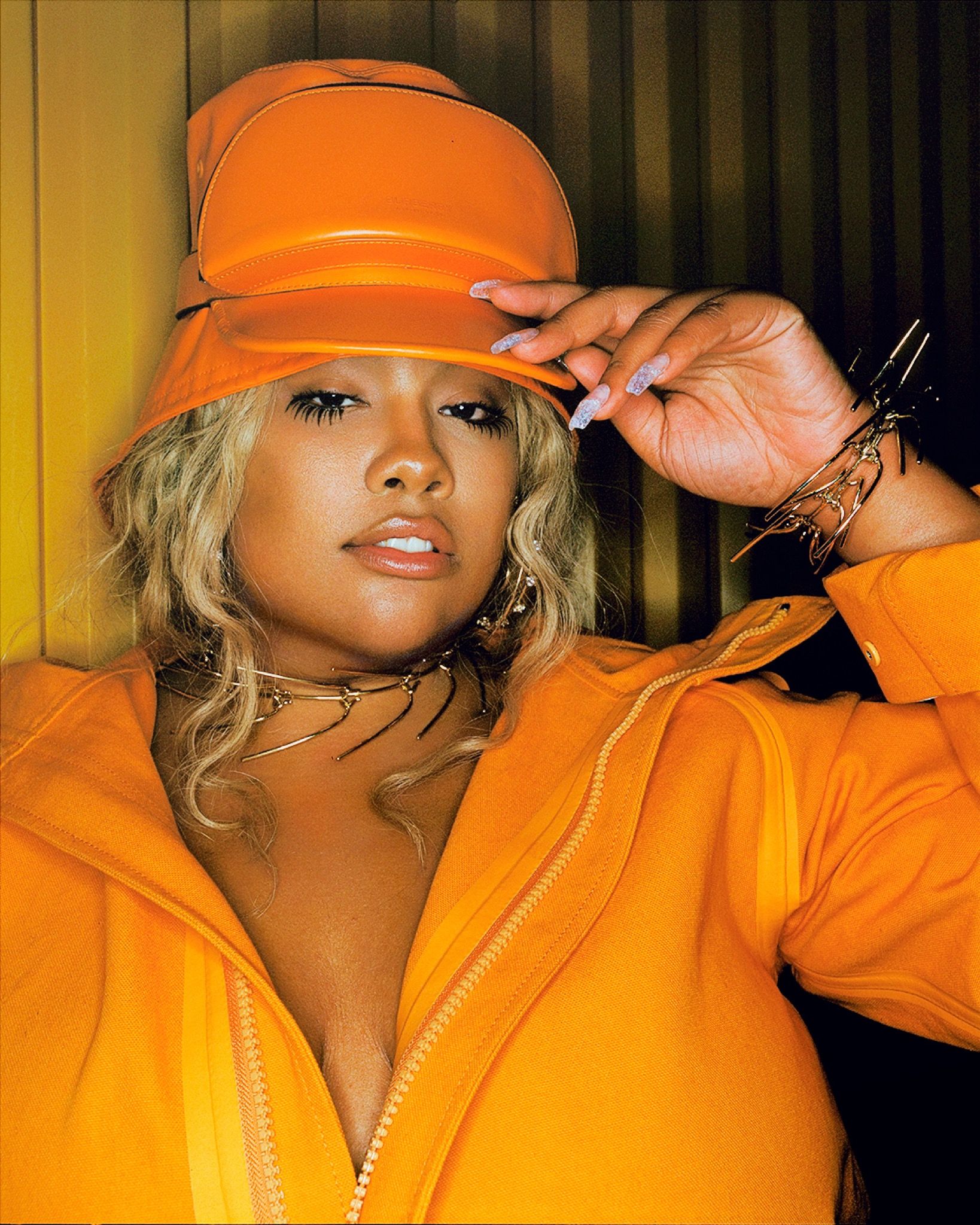
hat and coat BURBERRY; necklace MUGLER; earrings PANCONESI; bodysuit SKIMS
As she gets her makeup done by beauty artist Raisa Flowers, Shygirl, without announcement, takes over the Bluetooth speaker and plays a dozen demos from her phone. The unreleased material reveals her expanding world, presenting a multitude of moods and narrating predicaments that deal with self-love, relationships, introspection, vulnerability, personal freedom, and – yes – sexual prowess. The playlist she shares encompasses a broad emotional spectrum, from lightheartedly fun to serious, jokes-aside deep. Influences as disparate as dancehall and breakbeat are woven together in a seamless flow, punctuated by recognizable signatures of renowned hip-hop producers and electronic musicians. The tracks’ success – and the expansion of Shygirl’s fanbase – are basically guaranteed. The Black technology of recontextualization is ever-present in Shygirl’s music, and its witty wordplay causes the crew – professionals of color, mostly women, femmes, and gay men, all close friends, sisterhoods, and chosen family – to gag, guffaw, slap the table, and kiss their teeth in joy. “She plays too much, right?” someone says, reappropriating an idiom once used to diminish Black femmes, but that in this room is a celebration.
Once Shygirl’s glam is done and she is in her first look – a shimmering purple dress and an oversized lavender-gray coat – Johnson, who has a reputation for quickly getting to the Kodak moment, waits as the talent walks toward him in silver stilettos. She is flocked by an attentive crew, but once she is in front of the camera, it’s apparent that she is alone, shutting us out, boldly at ease in front of Johnson’s lens. They have gone to a place artists go when they turn on, and the cloudy weather at the beach is not going to stop that. Shygirl’s fluid movements form a duet with the photographer’s, and even her instances of stillness are full of energy.
“I respond to other people’s art all the time, and I know the things that trigger an emotional reaction from me. I’m like, ‘Okay, how do I use that to make people understand where I’m coming from, and in turn to provoke a response from them?’ I don’t have an ego that thinks, just because I’ve felt something, I’m the only one who can feel it like that or feel it from that source. So I’m like, ‘How do I use that experience in order to better convey what I’m going through?’ Performance and aesthetics are important because sometimes even words can be misinterpreted. How people listen to you is … from their own viewpoint, and not everyone is going through the same experiences. There are other ways you can back up your communication – sometimes even removing the words and just using visuals. I find words can be such a trap sometimes. With language, people get so caught up in the experiences one can have with certain terminology that they don’t see the depth that can be reached with certain words. You’re just seeing the surface level. I think pictures and performance help provide the emotions behind that.”
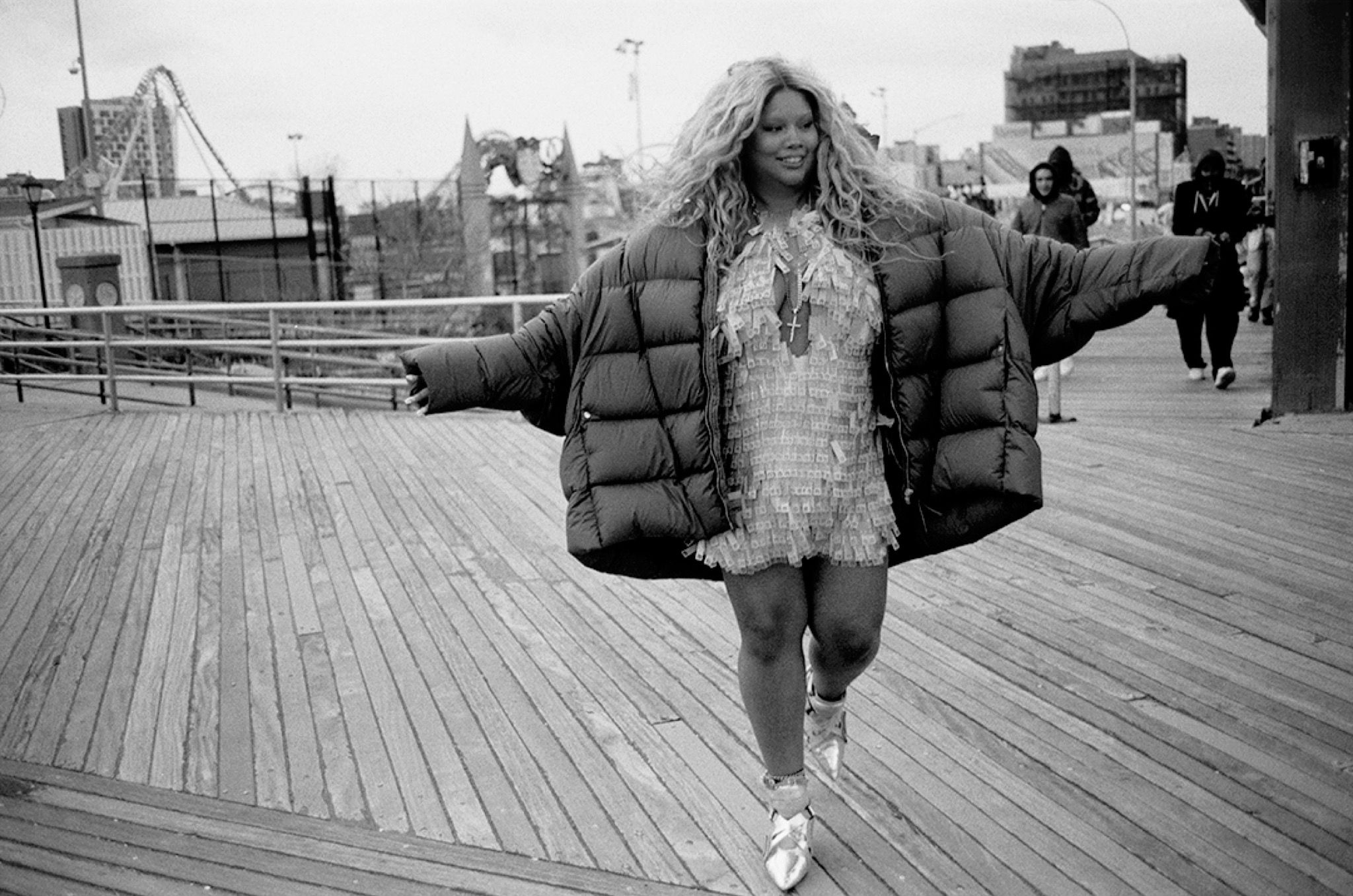
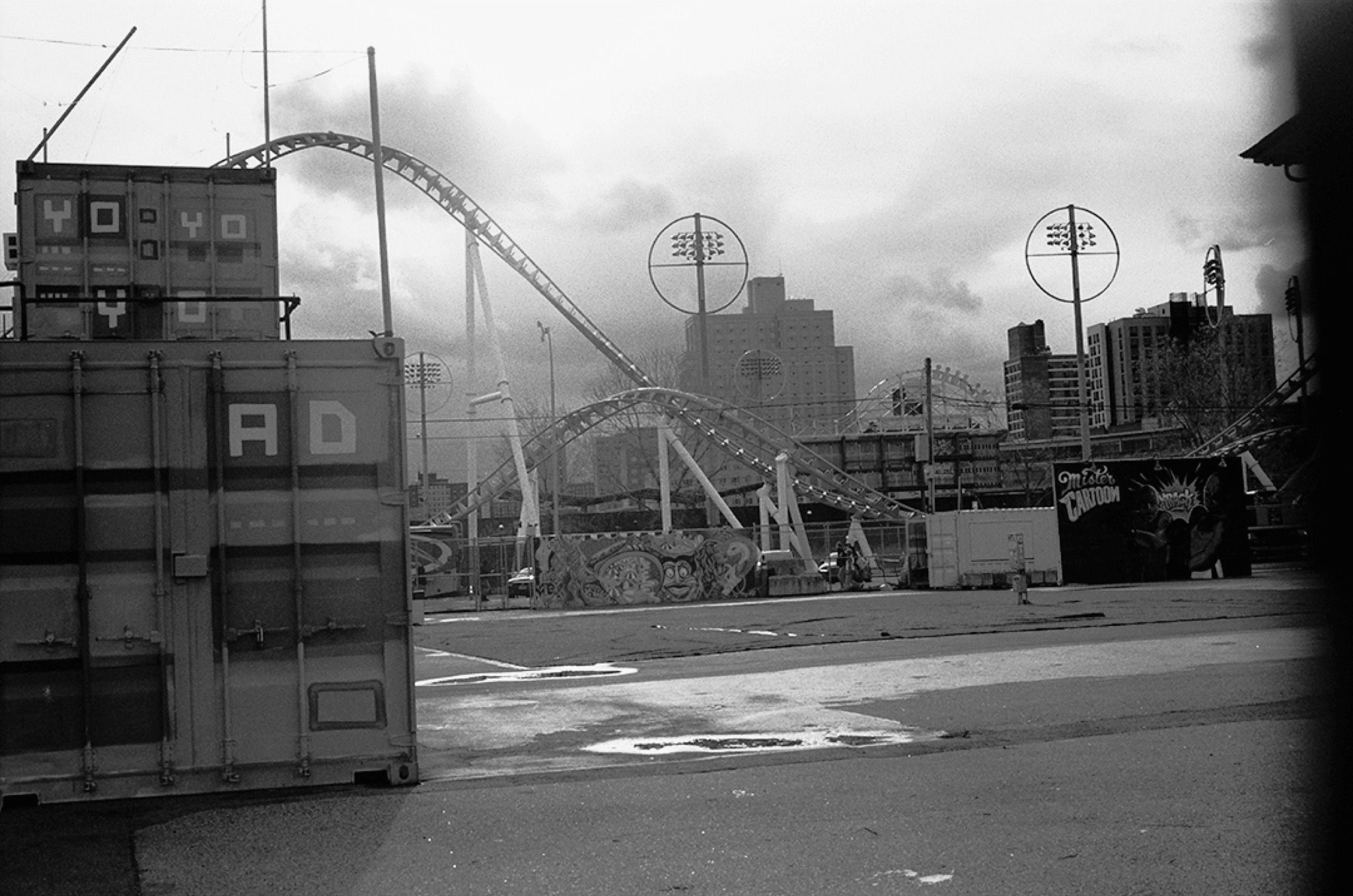
Left: jacket RICK OWENS; dress BARRAGÁN; shoes HOOD BY AIR; necklace AVERAGE CITIZEN; anklet DIOR ARCHIVES
Shygirl does not perform the sexual liberation expected of Black femmes who want approval in a world dominated by the male gaze. Her chosen moniker, “Shygirl,” is a challenge to social presumptions, and an homage to emerging from that systemic cocoon. Using performance, visuals, and movement – in her album art, music videos, live sets, and photo shoots like this one – in ways that evade the exploitative sexualization society imposes, she embodies an autonomous sexuality. Sometimes she’s lusty, at others carefree, serious, or camp – all qualities personified by the four alter egos she invented for Alias: Baddie, Bae, Bovine, and Bonk. To accompany the EP, she created an animated CGI avatar for each character, and every persona – alongside other shades of her character – is on display as Johnson shoots. As Shygirl breezes through outfits, looks, and scenes, she complicates every archetype and rejects every trope, including that of the “baddie” or “bad bitch.”
“People look at you more as a woman, even if you don’t want them to look at you. So you might as well use that gaze to your advantage. Men have plenty of advantages – things they don’t have to figure out. In hindsight, I might look back and see something as a disadvantage, but in the moment I only know what my advantages are – what tools I have, and how best to use them. So, I will use them so I feel like I’m engaging with them on my terms, rather than letting them take on the title of ‘misfortunes.’ If that’s the only livelihood you know, what else are you going to do, just let it roll over you? There are people who get loads of opportunities, but what do they do with them? Someone may look in my direction, but how do I hold their gaze? It’s about having something to give, and using what you have to your advantage – and it can’t just be me being a Black woman, because that doesn’t work. People talk about the ‘diversity hire.’ Well, that gets you through the door, but how do you stay? And is that where I want to be? I don’t want to be at anyone else’s table. I feel more comfortable in my own lane.”
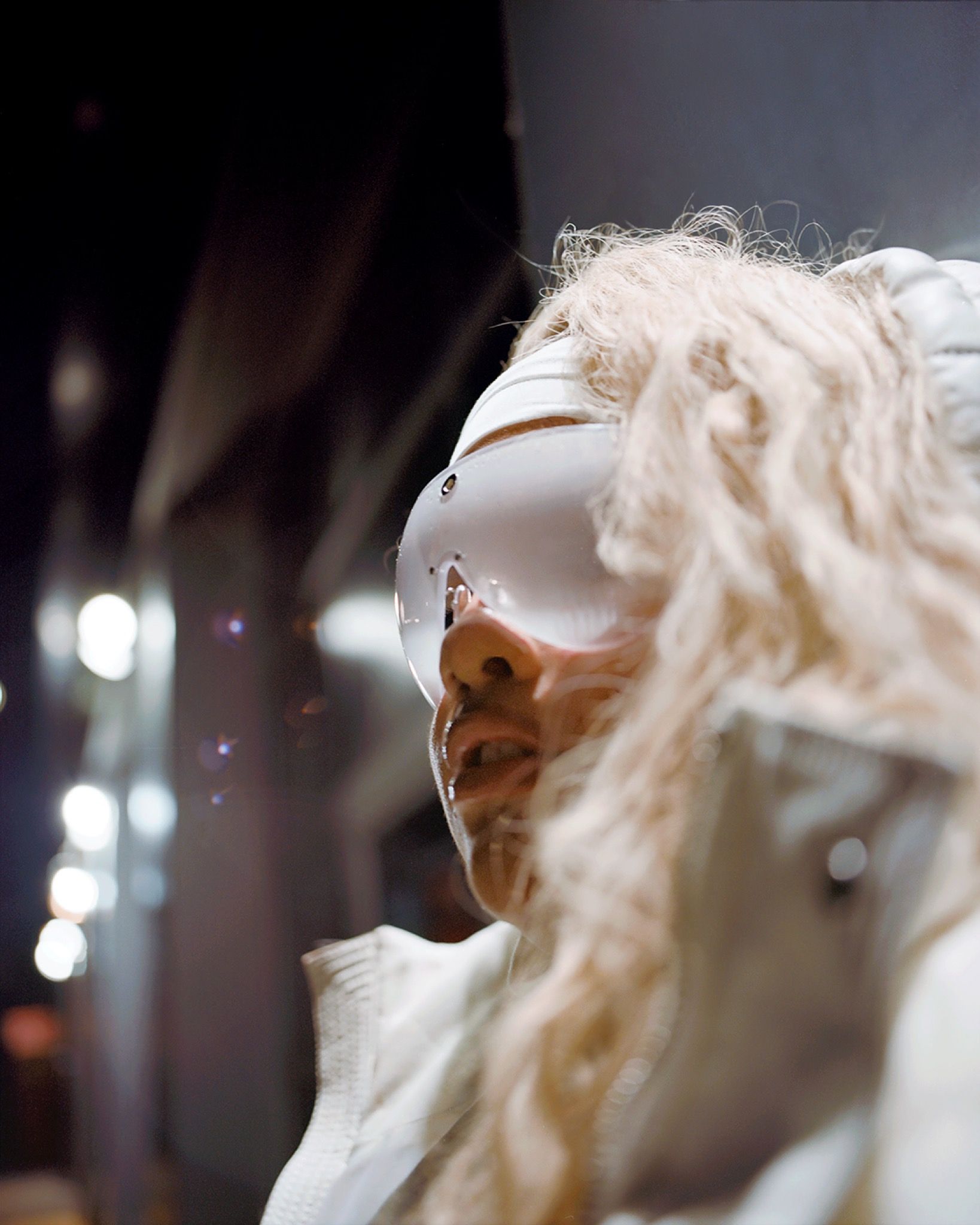
sunglasses and jewelry ACNE STUDIOS; jacket HOOD BY AIR; dress RICK OWENS; headband SHY'S OWN
Shygirl’s visual identity and her performance in front of Johnson’s camera speak to her time on the other side of the lens. Shygirl studied and worked in photography before focusing on music, so she is as well versed in being the voyeur as she is in being observed. Johnson has photographed a lot of musicians over the years, so he knows Shygirl is poised to create her own unique legacy in popular culture: in his words, “She’s blazin’.” Their flow on set has the energy present in his portraits of Eve, Queen Latifah, Lady Miss Kier, and the now-iconic images that became the album art for The Miseducation of Lauryn Hill. I ask for her feelings about the day, and about their collaboration.
“I’ve known Eric for a while, and have known his work even longer. Eric is the epitome of what a photographer should be – someone who has a real eye for people and their energies. Whether you know Eric’s name or not, everyone has interacted with his images. He’s one of those photographers who I get a sense of through their images, because I can see how comfortable the people are. Photography is the first medium I ever felt comfortable with, and I know what the relationship with a subject is like when they feel good. It’s nice to be on the other end of that. I know Eric is not putting me at ease on purpose – it’s just the way he is, and that is what puts me at ease. I can see his interest in me, and also in what I’m giving. He’s excited, which in turn makes you excited, because you want to see what he sees.”
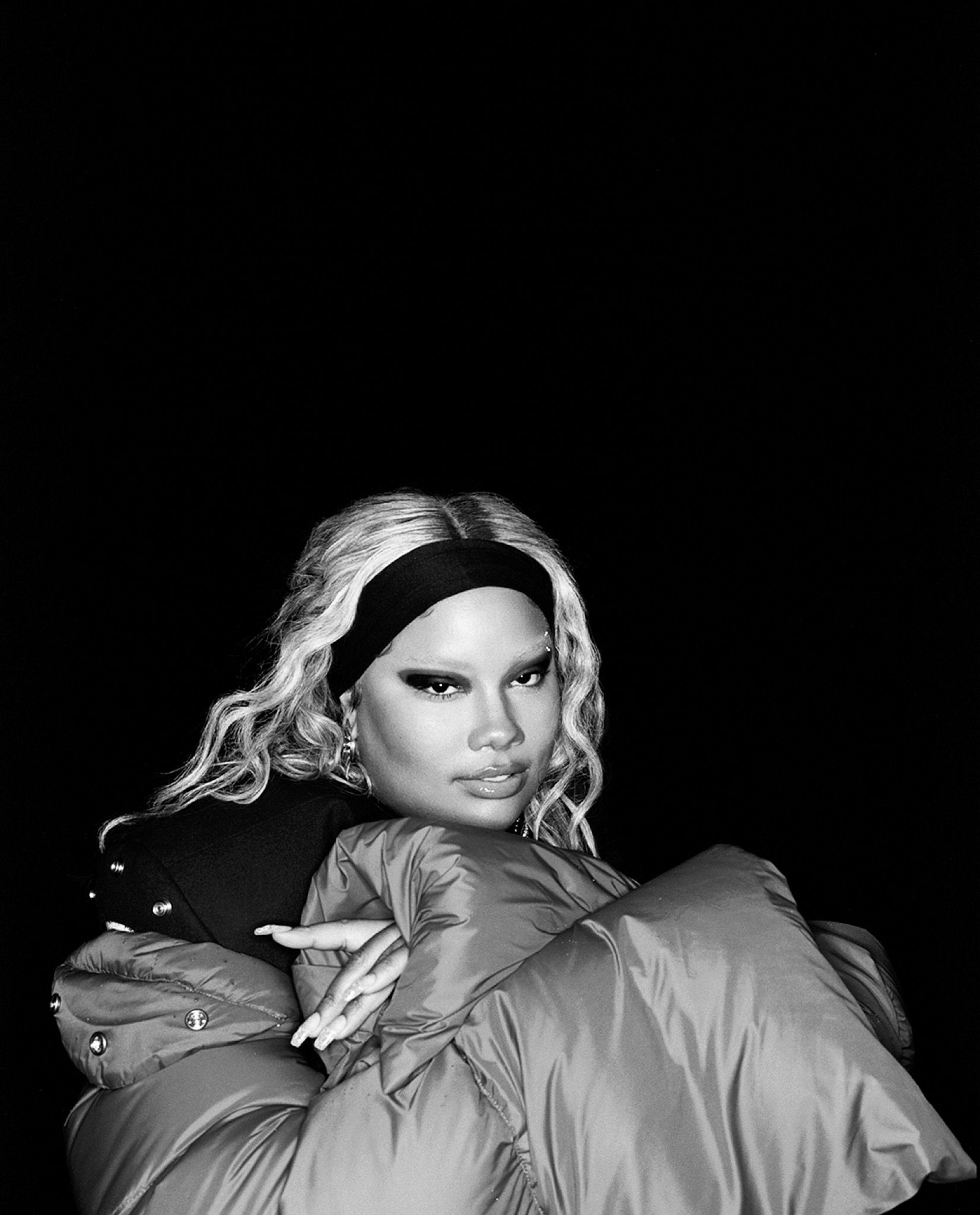
sunglasses and jewelry ACNE STUDIOS; jacket HOOD BY AIR; dress RICK OWENS; headband SHY'S OWN
Time flies on set, and midnight comes quickly. After spending hours by the beach in intermittent rain, Shygirl decides to throw on one last look. Her and Johnson’s drive to keep working is contagious. Soon, they are shooting the last roll of film. Half the crew directs hand-held lights for the perfect night shot; the other half frantically packs up garments and props. Shygirl, probably freezing now, remains unflinching.
“If you think about the imagery we’re exposed to – the exoticizing of Black women and all of the staging that has been pedaling our history for so long – the gaze still has not changed at all. It’s easy for some to become a caricature of themselves; an image that reflects the social dynamic they’re used to – you know, with people looking unquestionably at you. I want to question that gaze more, and I want for people to question that idea of access. Like, why do they expect to have that?”
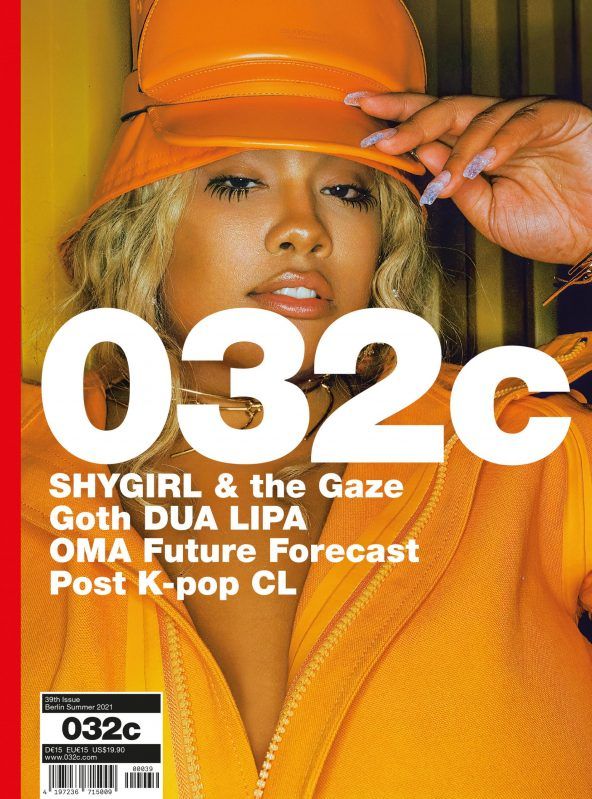
hat and coat BURBERRY necklace MUGLER earrings PANCONESI bodysuit SKIMS
Credits
- Text: Khalif Jones
- Talent: SHYGIRL
- Photography: Eric Johnson
- Fashion: Billy Lobos
- Hair: Latisha Chong
- Makeup: Raisa Flowers
- Nails: Dawn Sterling
- Production: Monika Martinez @ Public Space
- Creative Consultant: Robert Escalera
- Photography Assistants: Carter Tanton, Joey Labeija
- Fashion Assistant: Martin Jerez
- Hair Assistant: Karen Zamor
- Production Assistant: Luz Angelica Fernandez
- Post Production: Carter Tanton

